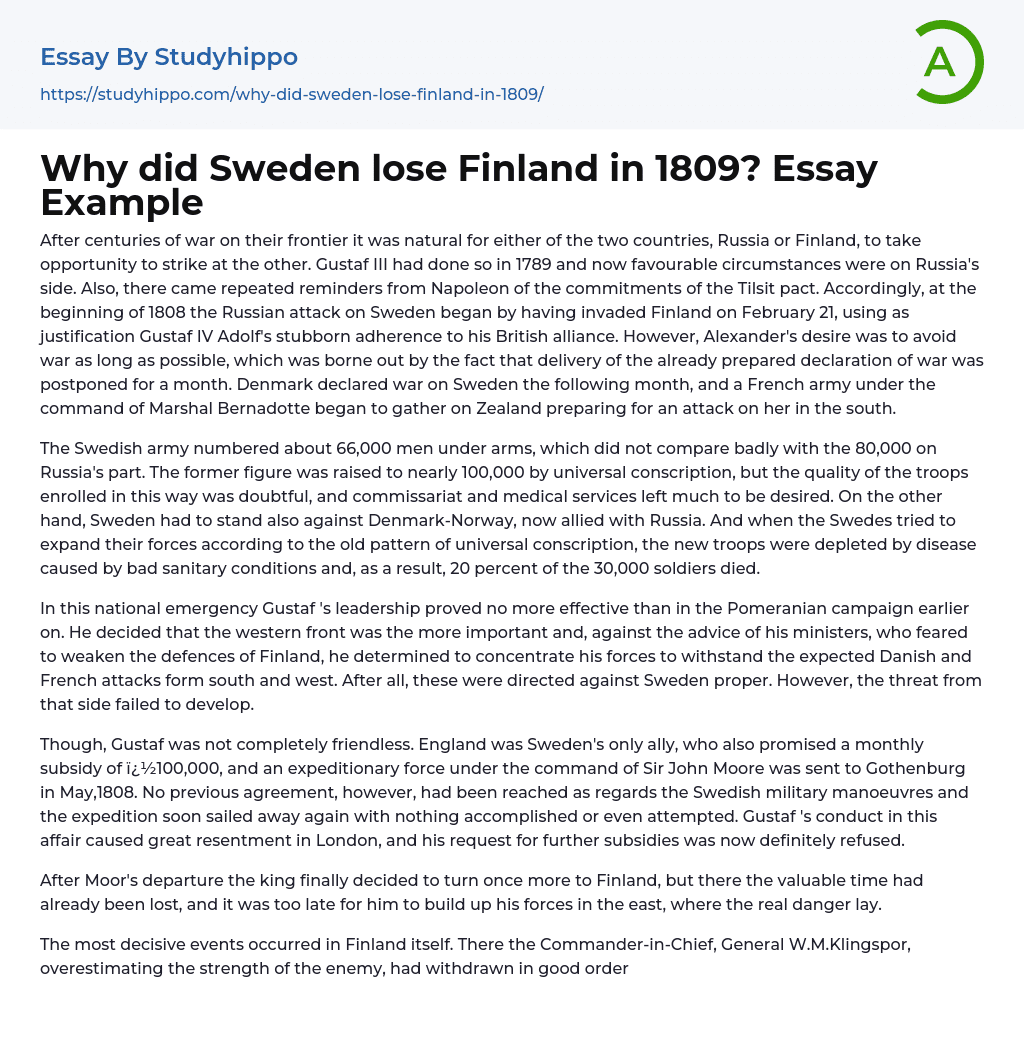After centuries of war on their frontier it was natural for either of the two countries, Russia or Finland, to take opportunity to strike at the other. Gustaf III had done so in 1789 and now favourable circumstances were on Russia's side. Also, there came repeated reminders from Napoleon of the commitments of the Tilsit pact. Accordingly, at the beginning of 1808 the Russian attack on Sweden began by having invaded Finland on February 21, using as justification Gustaf IV Adolf's stubborn adherence to his British alliance. However, Alexander's desire was to avoid war as long as possible, which was borne out by the fact that delivery of the already prepared declaration of war was postponed for a month. Denmark declared war on Sweden the following month, and a French army under the command of Marshal Bernadotte began to ga
...ther on Zealand preparing for an attack on her in the south.
The Swedish army numbered about 66,000 men under arms, which did not compare badly with the 80,000 on Russia's part. The former figure was raised to nearly 100,000 by universal conscription, but the quality of the troops enrolled in this way was doubtful, and commissariat and medical services left much to be desired. On the other hand, Sweden had to stand also against Denmark-Norway, now allied with Russia. And when the Swedes tried to expand their forces according to the old pattern of universal conscription, the new troops were depleted by disease caused by bad sanitary conditions and, as a result, 20 percent of the 30,000 soldiers died.
In this national emergency Gustaf 's leadership proved no more effective than in the Pomeranian campaign earlier on.
He decided that the western front was the more important and, against the advice of his ministers, who feared to weaken the defences of Finland, he determined to concentrate his forces to withstand the expected Danish and French attacks form south and west. After all, these were directed against Sweden proper. However, the threat from that side failed to develop.
Though, Gustaf was not completely friendless. England was Sweden's only ally, who also promised a monthly subsidy of �100,000, and an expeditionary force under the command of Sir John Moore was sent to Gothenburg in May,1808. No previous agreement, however, had been reached as regards the Swedish military manoeuvres and the expedition soon sailed away again with nothing accomplished or even attempted. Gustaf 's conduct in this affair caused great resentment in London, and his request for further subsidies was now definitely refused.
After Moor's departure the king finally decided to turn once more to Finland, but there the valuable time had already been lost, and it was too late for him to build up his forces in the east, where the real danger lay.
The most decisive events occurred in Finland itself. There the Commander-in-Chief, General W.M.Klingspor, overestimating the strength of the enemy, had withdrawn in good order towards a base in the north from which he was hoping to start a counter-attack on the Russians when more favourable circumstances offered. Despite the fact that there were hardly any losses during the retreat and no major defeat was sustained on the way, the retreat itself did much to lower the troops' morale. Many of the officers felt that defeat was inevitable and that Sweden's only hope of
salvation would be in close co-operation with France. It was said to be this mood that brought about the disaster that befell the Swedish troops before their king arrived. Also, equally undermining was the fact that whereas the Russian officers, fresh from campaigning in Sentral Europe, had a more modern conception of warfare, the higher offices in command of Finnish units had been trained along old-fashioned lines and they lacked vigour.
The fortress of Sveaborg, the so called the 'Gibraltar of the North', was to play a major role in any counter-offensive. Its importance was also increased by the presence there of the whole Archipelago Fleet, and its garrison of 7,000 men was well supplied with food and ammunition. The fortress was under the command of Karl Otto Cronstedt, the admiral who underestimated the strength of his position and was said to be rather pessimistic about
- John Locke essays
- 9/11 essays
- A Good Teacher essays
- A Healthy Diet essays
- A Modest Proposal essays
- A&P essays
- Academic Achievement essays
- Achievement essays
- Achieving goals essays
- Admission essays
- Advantages And Disadvantages Of Internet essays
- Alcoholic drinks essays
- Ammonia essays
- Analytical essays
- Ancient Olympic Games essays
- APA essays
- Arabian Peninsula essays
- Argument essays
- Argumentative essays
- Art essays
- Atlantic Ocean essays
- Auto-ethnography essays
- Autobiography essays
- Ballad essays
- Batman essays
- Binge Eating essays
- Black Power Movement essays
- Blogger essays
- Body Mass Index essays
- Book I Want a Wife essays
- Boycott essays
- Breastfeeding essays
- Bulimia Nervosa essays
- Business essays
- Business Process essays
- Canterbury essays
- Carbonate essays
- Catalina de Erauso essays
- Cause and Effect essays
- Cesar Chavez essays
- Character Analysis essays
- Chemical Compound essays
- Chemical Element essays
- Chemical Substance essays
- Cherokee essays
- Cherry essays
- Childhood Obesity essays
- Chlorine essays
- Classification essays
- Cognitive Science essays




